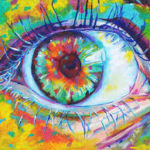An unbelievable invitation
So I’m having this relatively uneventful week, doing a bit of homework for my Dutch lessons, preparing for a class I’ll be teaching next term, defrosting the freezer, debating with a publisher as to why she should accept my next book, driving the kids to soccer and always arriving late, though no one seems to care, and wondering during my few un-busy moments what I’m actually doing with my life. Do I seriously think there’s more I can contribute to the addiction literature – besides blogging, which I love? Or should I hang up my spurs and take up growing tulips?
When all of a sudden I spy an email from the Mind and Life Institute, a group started by the Dalai Lama and a few other notables, whose mission is to identify links between the contemplative arts (e.g., Buddhist meditation) and neuroscience. I figured it was a generic invitation to their yearly conference. I went a few years ago, and it was actually great. Each day I woke up early, did a lot of yoga, ate a lot of vegetables, and spent many hours with my eyes closed, making infinitesimal progress toward enlightenment but getting pretty relaxed.
 No, it wasn’t that. It was a letter, addressed to me. I had to read it twice to believe it. It was an invitation to spend five days with the Dalai Lama at his residence in Dharamsala, all expenses paid. I would be one of fewer than ten scientists or scholars or addiction specialists, and we would be meeting with him throughout the five days to discuss craving and addiction. The Dalai Lama remains deeply interested in societal problems, especially those that might be addressed from both Buddhist and scientific perspectives. According to the letter, he sees addiction as a major source of suffering in today’s world. I have to agree with him there.
No, it wasn’t that. It was a letter, addressed to me. I had to read it twice to believe it. It was an invitation to spend five days with the Dalai Lama at his residence in Dharamsala, all expenses paid. I would be one of fewer than ten scientists or scholars or addiction specialists, and we would be meeting with him throughout the five days to discuss craving and addiction. The Dalai Lama remains deeply interested in societal problems, especially those that might be addressed from both Buddhist and scientific perspectives. According to the letter, he sees addiction as a major source of suffering in today’s world. I have to agree with him there.
So…yeah…I’m blinking rapidly and checking the address to make sure it’s not a hoax. They “very much hope you are able to join us for this special conference …” and would I please let them know as soon as possible. So I thought about it – for approximately 2 ½ seconds. I would give my left arm, maybe my right arm, to meet this man and talk about addiction with him and a few other folks. I’d go just for the ride. Just to be in his presence. Besides, Dharamsala isn’t Rotterdam. It’s halfway up the Himalayas. It’s a beautiful place according to the pictures. Just to be there would be an amazing trip, but to talk with this precious man about, let’s face it, my favourite subject. Yes, I accept!!!
I don’t know why I’m telling you all this. I guess just to share the most exciting moment in my life for the last couple of years. But this opportunity also brings to mind something I’ve thought about for awhile. When I argue my usual position, that addiction is not a disease, I often get a lot of flack. In particular, the disease advocates often argue that addiction must be a disease because it changes the brain, often irrevocably. And I argue back that I think addiction is an extreme form of normality, because normal learning also changes the brain, often irrevocably, especially when the learning concerns goals or intentions that are highly emotionally charged, such as falling in love, having a child, religious conversion, and, well, developing a serious fondness for coke, smack or booze. I haven’t yet been able to make my argument as articulate and convincing as I’d like to. In a recent post on a science blog, I tried to put it as succinctly as possible. And dozens of comments came back – most of which were not in agreement. So I’d counter that, if drug addiction was a disease, then so would gambling and other serious behavioural addictions be diseases, not to mention a passionate affair with the man or woman next door, and so on and so forth.
But how’s this for cutting to the chase: Just about everyone describes addiction as a continuous state of craving that can only be relieved by acquiring/doing the thing you crave. Whatever is going on in the brain, the psychology of it is  pretty straightforward. So if I were a Buddhist, I’d probably say: hey, that’s human existence for you. Human existence is characterized by longing, by craving…and then being propelled by the craving into grasping – which means going after the thing you crave and getting it. Which always lets you down, since material things never satisfy the emptiness that’s at the core of craving. Which is why Buddhists recommend that you do some serious meditating and thereby give up your attachments. When that starts to happen, then you can watch yourself being in a state of craving without going to the next step, grasping. You can just watch it, see it for what it is, and let it go.
pretty straightforward. So if I were a Buddhist, I’d probably say: hey, that’s human existence for you. Human existence is characterized by longing, by craving…and then being propelled by the craving into grasping – which means going after the thing you crave and getting it. Which always lets you down, since material things never satisfy the emptiness that’s at the core of craving. Which is why Buddhists recommend that you do some serious meditating and thereby give up your attachments. When that starts to happen, then you can watch yourself being in a state of craving without going to the next step, grasping. You can just watch it, see it for what it is, and let it go.
(Which may be why a lot of people find meditation extremely helpful for recovery.)
I wonder if the Dalai Lama will see addiction in a similar way. I suspect that he, of all people, will see it as an extreme form of attachment, which of course generates craving, which is why addicts suffer so much – until we’re able to watch the cravings come and go. I doubt I’d have to convince him than addiction is not a disease; it’s a highly focused state of longing – for something that glitters but isn’t even close to gold.
(Another reminder: Check out the Guest Memoir page, linked above. We’ve gotten a couple of new ones, and they’re really gripping. Please comment if you’ve got anything at all to add, or send us your own memoir.)
 While grief or money woes can cause depression at any stage of life, there are specific factors that make older people who experience depression more vulnerable to addiction, which in turn may be harder to treat.
While grief or money woes can cause depression at any stage of life, there are specific factors that make older people who experience depression more vulnerable to addiction, which in turn may be harder to treat. Doctors are often willing to prescribe these potentially addictive drugs for sleep problems or for vague aches and pains. They also may not spot a developing addiction because it’s too easy to misdiagnose declining mental ability or a dishevelled appearance as being due to depression or dementia rather than substance use.
Doctors are often willing to prescribe these potentially addictive drugs for sleep problems or for vague aches and pains. They also may not spot a developing addiction because it’s too easy to misdiagnose declining mental ability or a dishevelled appearance as being due to depression or dementia rather than substance use. Drug addiction is especially dangerous because our metabolism slows as we age. Substances take longer to filter through the liver and may build up in the body. This puts older adults at greater risk of dangerous side effects or accidental overdoses.
Drug addiction is especially dangerous because our metabolism slows as we age. Substances take longer to filter through the liver and may build up in the body. This puts older adults at greater risk of dangerous side effects or accidental overdoses. Yet older adults deserve the option to seek treatment if they want help with a substance use disorder. Just like younger people, they can and do overcome addictions with proper counselling and support.
Yet older adults deserve the option to seek treatment if they want help with a substance use disorder. Just like younger people, they can and do overcome addictions with proper counselling and support. With addiction, you think this thing, this substance (let’s say a few lines of coke) is valuable and special. And you feel the excitement of anticipation — soon I’m gonna have some. Then you feel the buzz, and doesn’t that feel great? Which strengthens the image, the conception, that coke is valuable and special. See how the thought/image and the feeling (both before and during) fuel each other? Which is why it’s so hard to say No thanks, not tonight.
With addiction, you think this thing, this substance (let’s say a few lines of coke) is valuable and special. And you feel the excitement of anticipation — soon I’m gonna have some. Then you feel the buzz, and doesn’t that feel great? Which strengthens the image, the conception, that coke is valuable and special. See how the thought/image and the feeling (both before and during) fuel each other? Which is why it’s so hard to say No thanks, not tonight. So what does the addictive substance or act symbolize? To me, that’s the big question. The longer I practice psychotherapy with people in addiction, the more convinced I am that each person constructs his or her own scenario, vignette, drama, diorama — I don’t know what to call it — based on what went wrong or what went missing in childhood or adolescence. I introduced this idea last post, in terms of diving into the child self-narrative. Here I want to get into the details: what’s the narrative about?
So what does the addictive substance or act symbolize? To me, that’s the big question. The longer I practice psychotherapy with people in addiction, the more convinced I am that each person constructs his or her own scenario, vignette, drama, diorama — I don’t know what to call it — based on what went wrong or what went missing in childhood or adolescence. I introduced this idea last post, in terms of diving into the child self-narrative. Here I want to get into the details: what’s the narrative about? she was achingly lonely. But when she went into her closet and cut little red lines in her forearm, she felt free, she felt vital, she was unobserved, she didn’t need or seek permission, she felt defiant, and most of all she felt in control of her own feelings. That’s what the cutting meant to her then. And that’s almost exactly what coke means to her now, decades later.
she was achingly lonely. But when she went into her closet and cut little red lines in her forearm, she felt free, she felt vital, she was unobserved, she didn’t need or seek permission, she felt defiant, and most of all she felt in control of her own feelings. That’s what the cutting meant to her then. And that’s almost exactly what coke means to her now, decades later.  She scampers into the bathroom, leaving the other ladies chatting over wine or coffee, and does a couple of lines. Again, she’s on her own, released, free, defiant, and in control of what she’s feeling. Now take that symbolic scenario she’s created, and graft it onto the feeling of the anticipation and then the feeling of the rush itself. That cognition-emotion linkage has been reinforced thousands of times. It’s not going to go away easily.
She scampers into the bathroom, leaving the other ladies chatting over wine or coffee, and does a couple of lines. Again, she’s on her own, released, free, defiant, and in control of what she’s feeling. Now take that symbolic scenario she’s created, and graft it onto the feeling of the anticipation and then the feeling of the rush itself. That cognition-emotion linkage has been reinforced thousands of times. It’s not going to go away easily. with my armful of chips. Now couple that image with the sheer excitement of not knowing how the next hand will turn out. (That’s a big deal for gamblers.) The image and the feeling fuse — possibly forever.
with my armful of chips. Now couple that image with the sheer excitement of not knowing how the next hand will turn out. (That’s a big deal for gamblers.) The image and the feeling fuse — possibly forever. A couple of my clients have combined drugs, sex or sexting, and/or porn into this incredibly artful (what else to call it?) ritual — a scenario in which they are desirable, desired, potent, free, and safe. The experience they’re addicted to is basically a fantasy of being both very good and very bad, nasty and safe at the same time — the dream fantasy of a child or young teenager. But here’s the thing: the components — the coke and the porn for example — are only valuable in how they contribute to this symbolic amalgam. What each offers, without that symbolic currency, is almost nothing at all.
A couple of my clients have combined drugs, sex or sexting, and/or porn into this incredibly artful (what else to call it?) ritual — a scenario in which they are desirable, desired, potent, free, and safe. The experience they’re addicted to is basically a fantasy of being both very good and very bad, nasty and safe at the same time — the dream fantasy of a child or young teenager. But here’s the thing: the components — the coke and the porn for example — are only valuable in how they contribute to this symbolic amalgam. What each offers, without that symbolic currency, is almost nothing at all. So I’ve got a prescription for some pretty powerful opioids. And as soon as I pop one or two, the whole symbolic vignette from my days of addiction returns. I get to make myself warm and safe, I get to be taken care of, like when I was sick as a child — come here, Mommy, I need you — and I get to control all that with
So I’ve got a prescription for some pretty powerful opioids. And as soon as I pop one or two, the whole symbolic vignette from my days of addiction returns. I get to make myself warm and safe, I get to be taken care of, like when I was sick as a child — come here, Mommy, I need you — and I get to control all that with  these little objects — the pills — which are mine! (particularly handy if Mom isn’t feeling very connected). That symbolism is so much more powerful than the feeling the drug provides. Yet the drug does provide a feeling…a warmth in my stomach, a vague but familiar sense of pleasure. What I’m saying is that this feeling is pretty nice (though I know it will collapse into boredom soon enough), but its power lies in how it holds the symbolic scenario in place.
these little objects — the pills — which are mine! (particularly handy if Mom isn’t feeling very connected). That symbolism is so much more powerful than the feeling the drug provides. Yet the drug does provide a feeling…a warmth in my stomach, a vague but familiar sense of pleasure. What I’m saying is that this feeling is pretty nice (though I know it will collapse into boredom soon enough), but its power lies in how it holds the symbolic scenario in place. But man, do I ever get what it’s like, for my addicted clients, and for almost anyone fighting that so-powerful amalgam of thought and feeling: the fabricated scene, the sense of completeness, the revised reality, and the control you take (or at least hope for) — an entrenched (but fantasized) improvement over what it was really like to be young and scared, alone and helpless.
But man, do I ever get what it’s like, for my addicted clients, and for almost anyone fighting that so-powerful amalgam of thought and feeling: the fabricated scene, the sense of completeness, the revised reality, and the control you take (or at least hope for) — an entrenched (but fantasized) improvement over what it was really like to be young and scared, alone and helpless. Informed by unparalleled neuroscientific insight and written with his usual flare, Marc Lewis’s The Biology of Desire effectively refutes the medical view of addiction as a brain disease. A bracing and informative corrective to the muddle that now characterizes public and professional discourse on this topic.” —Gabor Maté, M.D., author of In The Realm of Hungry Ghosts: Close Encounters With Addiction
Informed by unparalleled neuroscientific insight and written with his usual flare, Marc Lewis’s The Biology of Desire effectively refutes the medical view of addiction as a brain disease. A bracing and informative corrective to the muddle that now characterizes public and professional discourse on this topic.” —Gabor Maté, M.D., author of In The Realm of Hungry Ghosts: Close Encounters With Addiction
Recent Comments